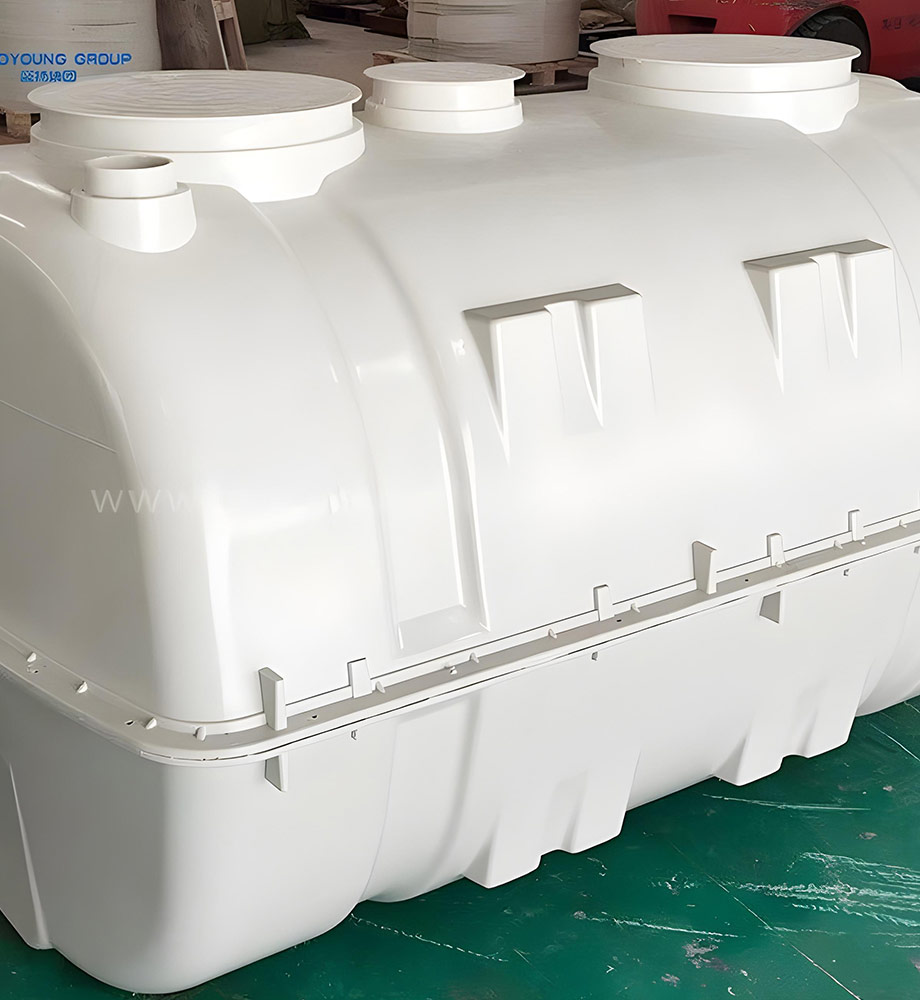Key Features
- Corrosion-Resistant Construction: Fiberglass-reinforced polymer resins are inherently corrosion-resistant, resisting chemicals, acids, alkalies and microbe attack.
- Lightweight and High Strength: High strength-to-weight ratio allows large capacity tanks with thinner walls, facilitating transport and installation. FRP tanks are typically 80–90% lighter than concrete equivalents.
- Smooth Leak-Proof Interior: Seamless FRP liners provide a non-porous, impermeable surface that prevents leaks and infiltration. No internal coatings or linings required.
- Custom Sizes and Designs: Manufactured in a variety of shapes (cylindrical, rectangular, segmented) and sizes (from a few hundred liters to tens of thousands of liters).
- UV-Stabilized Surface: Tanks can be UV-stabilized for exposed installations, preventing degradation or discoloration from sunlight.
- Easy Installation: Foldable or modular options and integrated lifting lugs reduce installation time and manpower.
Benefits
- Extended Service Life: Non-corroding FRP material means tanks last decades longer than steel or concrete in sewage applications.
- Low Maintenance Costs: Virtually maintenance-free operation; no painting, grouting, or cathodic protection needed, reducing lifecycle costs.
- Cost-Effective Handling: Lightweight FRP reduces shipping and foundation costs. Quick installation with minimal heavy equipment.
- Improved Plant Safety: No rust or flaking materials into the wastewater; smooth surface resists biological growth and odours.
- Environmentally Friendly: Fully inert material avoids contamination; design is leak-proof to protect groundwater.
Applications
- Municipal and industrial sewage holding tanks, equalization tanks, and buffer tanks.
- Septic systems and decentralized wastewater treatment units.
- Process effluent storage in water treatment and chemical plants.
- Industrial wastewater pretreatment and blending tanks.
- Stormwater or runoff storage in chemical or food processing facilities (due to corrosion resistance).
Technical Specifications
- Material of Construction: FRP (glass-fiber reinforced polyester, vinylester or epoxy resin); resin grade chosen per chemical exposure.
- Typical Capacity: Ranges from hundreds to hundreds of thousands of liters (custom sizes up to 50,000+ L common).
- Operating Temperature: Typically up to 60–80°C, depending on resin; some formulations allow higher.
- Pressure Rating: Generally atmospheric or low-pressure (up to 0.5 bar); can be designed for slight internal pressure if needed.
- Standards & Codes: Designed per relevant standards (e.g., ASTM D3299/D4097, IS 16220, IS 3593); quality assured under ISO 9001.
- Accessories: Manholes, vent pipes, inlet/outlet flanges, level indicators, internal partitions as needed.
Unique Selling Points (USPs)
- Complete Turnkey Solutions: Full-service engineering from design through commissioning, including foundation design and utilities integration.
- Superior Corrosion Protection: Dual-bias or multi-layer layups with vinylester resin provide extra acid resistance.
- Rapid Deployment: Prefabricated one-piece tanks and modular panels enable fast installation, minimizing plant downtime.
- Track Record & Quality: Proven in hundreds of STP installations; 3rd-party certified manufacturing ensures consistent quality.

